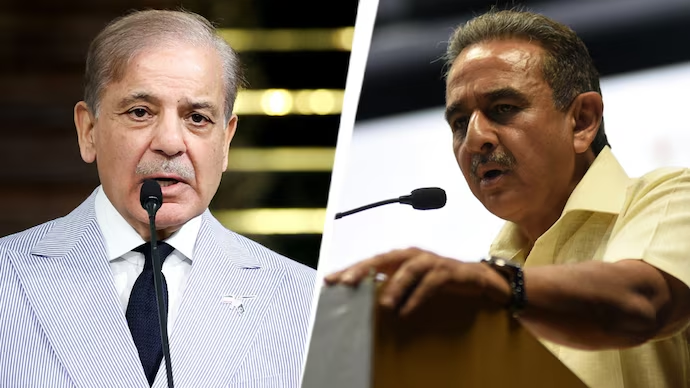India slams Pakistan’s UN remarks on Indus Waters Treaty, citing 5 strong reasons including terrorism and climate realities for treaty suspension.
Introduction
India has strongly rejected Pakistan’s allegations regarding the suspension of the Indus Waters Treaty (IWT), calling them unfounded and politically motivated. At a recent United Nations conference in Tajikistan, Pakistan Prime Minister Shehbaz Sharif accused India of weaponising water by unilaterally suspending the treaty. India swiftly rebutted, blaming Islamabad’s persistent cross-border terrorism for the treaty’s strained implementation.
What Triggered the Diplomatic Face-off?
The diplomatic standoff unfolded at the International Conference on Glaciers’ Preservation held in Dushanbe, Tajikistan. During his speech, PM Sharif alleged that India’s decision to suspend the Indus Waters Treaty was an “illegal” and “unilateral” move, affecting millions of lives in Pakistan.
In response, Indian Union Minister Kirti Vardhan Singh took the floor to issue a firm rebuttal, accusing Pakistan of misusing the UN platform for political purposes and failing to uphold its obligations under the treaty.
India’s Firm Stand: Cross-Border Terrorism is the Root Cause
Union Minister Singh clearly outlined India’s position:
“We are appalled at the attempt by Pakistan to misuse the forum… The unrelenting cross-border terrorism from Pakistan interferes with the ability to exploit the treaty as per its provisions.”
He added that the real breach of the treaty stems from terror attacks emanating from Pakistani soil, especially referencing the April 22 attack in Pahalgam, Jammu & Kashmir, where 26 civilians lost their lives. The attackers were linked to Pakistan-based terror outfits.
Also Read: Top 5 Upcoming Mahindra Electric Cars You Can’t Miss in India Worth Waiting For in India
Background: What is the Indus Waters Treaty (IWT)?
Signed in 1960 between India and Pakistan with the World Bank as a mediator, the Indus Waters Treaty governs the distribution of water from the Indus River system.
Key Provisions:
-
Pakistan gets control over the three western rivers: Indus, Jhelum, and Chenab.
-
India controls the eastern rivers: Ravi, Beas, and Sutlej.
-
India can use the western rivers for non-consumptive use, such as hydropower.
The treaty has survived wars and conflicts between the two nations, but India has now argued that the security environment has changed fundamentally, warranting a review or reassessment.
Pakistan’s Position: “Weaponisation of Water”
At the conference, PM Shehbaz Sharif painted a grim picture:
“India’s unilateral decision is deeply regrettable… Water must not be used as a weapon. Millions of lives must not be held hostage to narrow political interests.”
Sharif went on to declare that Pakistan would not allow this red line to be crossed, suggesting strong diplomatic or legal responses could follow.
India Counters With Changing Realities
India has stressed that since the treaty was signed in 1960, circumstances have drastically changed. These include:
-
Technological advancements in dam and irrigation systems
-
Climate change leading to glacial melt and unpredictable water availability
-
Demographic pressure from growing populations on both sides
-
Most importantly, ongoing terrorism from Pakistan, which violates the spirit of cooperation and peace envisioned by the treaty
Singh noted that treaties are built on trust, and India cannot uphold its obligations under a treaty while facing continuous aggression from the other side.
India’s Strategic Shift: Policy of Zero Tolerance
India’s stance is consistent with its broader zero-tolerance policy towards terrorism. The decision to suspend the IWT is part of a larger shift in India’s foreign policy, where strategic patience is being replaced by firm diplomatic measures.
Since the Pulwama terror attack (2019) and the surgical strikes, India has gradually withdrawn privileges extended to Pakistan, and the treaty suspension is seen as a continuation of that strategy.
For Official new, Stop blaming others: India rips Pak at UN meet over Indus Waters Treaty remark
Global Reactions and Implications
Though most international powers have remained neutral, many analysts believe this face-off could set a precedent for how climate issues and terrorism intersect with international treaties.
The World Bank, a signatory and guara`ntor of the original treaty, has not yet issued a statement, but pressure may mount for mediation if tensions escalate further.
India’s strong message at the UN underscores that national security concerns will take precedence over diplomatic niceties. As Kirti Vardhan Singh aptly stated:
“Pakistan, which itself is in violation of the treaty, should desist from blaming India.”
India has drawn a clear line: You cannot expect cooperation on water sharing while enabling terrorism across borders.
FAQs on the Indus Waters Treaty Dispute
Q1: What is the Indus Waters Treaty?
The treaty, signed in 1960, divides the Indus River system between India and Pakistan, ensuring peaceful water sharing. It was brokered by the World Bank.
Q2: Why did India suspend the treaty now?
India suspended it in response to repeated terrorist attacks from Pakistan, most notably the Pahalgam attack on April 22, 2025.
Q3: Can Pakistan take India to an international court?
Pakistan may appeal to the World Bank or international arbitration, but India maintains that terrorism breaches the treaty’s foundation.
Q4: Has the treaty ever been suspended before?
No, this is the first formal suspension of its kind, making it historically significant.
Q5: What impact will this have on Pakistan?
Pakistan could face severe agricultural and water shortages if India restricts flow from rivers it legally controls.
